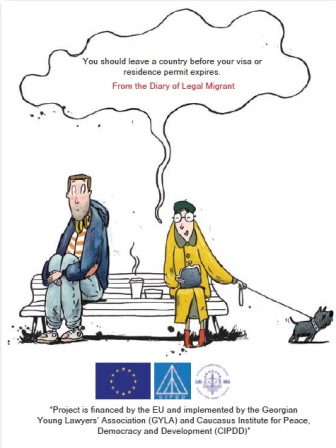Threats of irregular migration

If you plan to travel abroad, double-check the reliability of educational program or an offered job before departure, and take necessary precautions. take into consideration that irregular emigration to a foreign country is an illegal act, posing serious risks.
- Always collect the background information on the organization offering assistance in finding a job, an educational or internship program, or assistance in moving abroad;
- To obtain a visa, apply to a diplomatic mission or a consular service of a destination country personally;
- Do not hand in your passport or any other document certifying your identity to any other person;
- Check in advance the details of the job offered by an employer. ask for contact details of your employer or an educational institution;
- Keep in mind that you will only be able to defend your legal rights and interests on the basis of your employment contract drafted in full conformity with the legislation. do not agree to start a job until a corresponding work contract has been signed.
The types of irregular migration are the following: human trafficking, illegal border crossing, illegal transportation of a person across the border (smuggling), and overstay on the territory of the country after the period of the legal stay expires. Upon a preliminary agreement and in return for a certain sum paid crime gangs illegally transfer migrants across a border into the countries where they have neither a citizenship, nor documents for legal entry. In such cases, the relationship between crime gangs and migrants ends upon the crossing the border. However, due to an illegal status in the foreign country, these migrants may easily become dependent on the people who smuggled them in. Crime gangs often get advantage of such situation and force migrants to work without any reimbursement and thus cover the costs which the smugglers spend for their transportation.
Human Trafficking is a modern day slavery, in which people are involved by deception, coercion, threat, or other forms of violence. the victims of the trafficking are restricted independence, free movement and choice, and become victims of physical, psychological, or sexual violence.
The most common forms of human trafficking include:
- Trafficking in women and children for sexual exploitation;
- Forced labour in agriculture, construction, household and other sectors;
- Trafficking in human organs.
Human trafficking and illegal border crossing is the second largest crime industry in the world and is run by the large international criminal networks. due to present-day toughened immigration policy and improved border monitoring technologies in developed countries, an increasing number of irregular migrants become victims of those criminal groups.
Even if a migrant legally enters and stays in a foreign country and intends to stay there for a long time, he/she must take into account that upon the expiry of the term of visa or residence permit, his/her legal status becomes illegal. illegal status is associated with increased risks to physical safety and personal freedom of a person; moreover, those staying illegally cannot use health care, education and other community/social services available to the holders of the legal status. these risks can only be avoided by maintaining a legal status abroad and by legal migration.
Usually, the living conditions of irregular migrants are poor. They often cannot afford renting a decent apartment; while those who agree to provide housing to irregular migrants usually offer accommodations with unsatisfactory living and safety conditions in dangerous districts.
If:
- anyone restricts your freedom;
- an employer has seized your identification document;
- you have become a victim of violence;
Immediately contact the Georgia’s diplomatic mission or consular office in the country of your residence, which is obliged to protect your rights and legal interests. in this case it does not matter whether your stay in the foreign country is legal or illegal. in case you wish so, Georgia’s diplomatic mission or consular office can issue relevant documents and ensure your safe return to the home country.
If there isn't a Georgia’s diplomatic mission or consular office in a country you are residing, report to the law enforcement entities, organisations working on human rights, migrant associations, representation of diaspora and/or trade unions of the country. You may also call the hotline of the ministry of Foreign affairs of Georgia at: +995 322 945 050 during working hours.
In case of emergency, call the 24 hours hotline: +995 577 984 020.
You can also contact the ministry of Foreign affairs via email at: consulinfo@mfa.gov.ge.
In cases of trafficking, also call the hotline of the ministry of internal affairs of Georgia: +995 322 411 714.
Victims of trafficking are eligible to the special protection from the state through medical, psychological, and other types of assistance. the State Fund for Protection and assistance of (Statutory) Victims of Human trafficking (atiP Fund) is operating in Georgia and can be reached at the hotline: +995 322 116 006.
